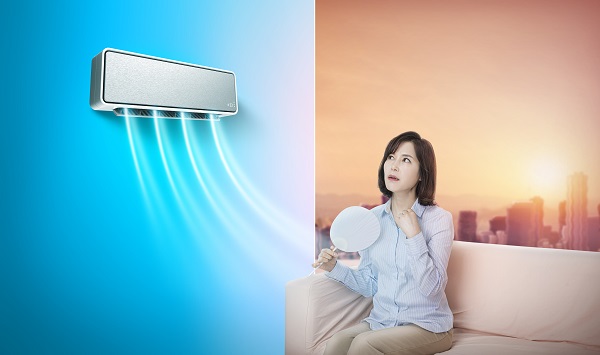
After the end of the rainy season, consecutive heatwaves prevail, and health warnings are on. Above all, during the summer, people experience rapid changes in body temperature several times a day. Especially outdoors, one should be particularly cautious of heat-related illnesses, and indoors, be careful of air-conditioning sickness. Moreover, with the recent resurgence of COVID-19, an increasing number of people cannot cope with symptoms promptly.
Heat-related illness patients have already occurred in significant numbers. According to the statistics from the Korea Centers for Disease Control and Prevention (KCDC) on the heat-related illness emergency room monitoring system, as many as 255 patients visited the emergency room due to heat-related illnesses from the 26th to the 29th of last month nationwide.
Heat-related illness is an acute condition caused by prolonged exposure to hot environments. Our bodies have a homeostatic mechanism that regulates body temperature appropriately based on the situation, controlled by the hypothalamus in the brain. However, when exposed to high temperatures for an extended period, the hypothalamus may not function properly if the body temperature rises above 38 degrees Celsius. As a result, heat accumulates within the body, leading to various symptoms that can threaten life.
Commonly, people may only think of heatstroke and sunstroke, but heat-related illnesses encompass various conditions, such as ▲ heat syncope (fainting) ▲heat cramps ▲heat exhaustion ▲heatstroke, and more.
▲ Heat syncope is when one experiences momentary dizziness or lightheadedness due to high body temperature, which can lead to dehydration and reduced cerebral blood flow, resulting in fainting. When experiencing these symptoms, moving to a more relaxed cool place and hydrating with fluids is advised. Simple heat syncope can be quickly relieved with rest.
▲ Heat cramps occur when one engages in prolonged physical activity or works in a hot environment without sufficient replenishment of electrolytes. Especially during the hot summer, excessive sweating during prolonged exercise can lead to muscle cramps. When experiencing heat cramps, it is advised to immediately stretch the affected muscles in a cool shade and avoid vigorous exercise for at least a few hours. Rest while consuming electrolyte-containing fluids is recommended. If electrolyte drinks are unavailable, adding one to two teaspoons of salt to one liter of water and drinking it can also be helpful.
▲ Heat exhaustion, commonly known as heat stroke, is the most common form of heat-related illness. It occurs due to dehydration and insufficient body fluids, leading to dizziness, weakness, confusion, nausea, flushing, and vomiting. Although body temperature rises to around 38 to 40 degrees Celsius, consciousness remains clear. Resting in a cool place and replenishing with water and electrolytes are essential for recovery.
▲ Heatstroke is literally a heat-induced stroke and is the most dangerous form of heat-related illness. With body temperature rising above 40 degrees Celsius, it can cause severe damage to the brain. Heatstroke occurs when the body's temperature-regulating mechanism fails, leading to a cessation of heat dissipation through the skin. About 80% of cases arise suddenly without warning signs. Symptoms include high fever (above 40 degrees), decreased sweating (due to sweat gland destruction), seizures due to central nervous system abnormalities, altered consciousness, and one-sided paralysis. While it may resemble sunstroke, heatstroke is distinguished by the absence of sweating, severe nausea, vomiting, and changes in consciousness.
Heat stroke requires immediate and proactive intervention. The patient should be moved to a shady area, and their clothing should be removed while cooling them with a damp, cool towel. Promptly calling emergency services (911) is crucial. While drinking cold water can help lower body temperature, it should be avoided if the person is unconscious to prevent choking. Cold baths and ice packs should also be avoided as they might worsen the condition.
Professor Ji Jae-gu of Inje University Busan Paik Hospital's Department of Emergency Medicine emphasized the importance of distinguishing between heat stroke and heat exhaustion. Heat stroke is a life-threatening condition that can lead to fatalities if left untreated, and there is a high possibility that heat exhaustion or heat cramps can progress to heat stroke if ignored. He urged particular caution for vulnerable populations, such as the elderly and young children with compromised temperature regulation abilities and individuals with thyroid issues, diabetes, chronic kidney disease, and cardiovascular disorders that can be exacerbated by increased heart rate and cardiac strain.
Preventing heat-related illnesses is the best approach. Professor Son Ki-young of the Department of Family Medicine at Seoul Asan Hospital advised the following preventive measures: ▲Avoid outdoor activities during peak hours (12 pm to 5 pm) ▲Regularly consume an adequate amount of fluids ▲Take breaks in cool places when engaging in unavoidable outdoor tasks ▲Immediately inform someone nearby if feeling dizzy or experiencing symptoms of dehydration ▲Never leave children or seniors alone in closed vehicles.
Air-conditioner disease refers to summer colds due to prolonged exposure to air-conditioning units. Colds are caused by viruses that lead to inflammation in the respiratory system. During this summer, the immune system can weaken with repeated heavy rains and heat waves, increasing the likelihood of catching a cold when excessively exposed to air conditioning.
In the early stages, it starts with a dry throat and a mild cough, but as it worsens, it becomes difficult to swallow saliva or food, and symptoms such as headache, fever, and chills may appear. Often, loss of appetite and poor appetite accompany these symptoms. There may also be symptoms like conjunctivitis or diarrhea, and when the throat condition becomes severe, pain may occur when breathing or around the ears.
Kangdong Kyung Hee University Hospital's Professor Choi Cheon-woong, an expert in respiratory medicine, emphasized that although many types of viruses and bacteria cause throat infections, making vaccine development difficult, most cases can be well treated with symptomatic relief therapy. However, he pointed out that older adults, young children, and immunocompromised individuals (such as those who have undergone transplantation surgery) need to be careful, as throat infection symptoms, even as mild as a cough, could lead to conditions like otitis media, sinusitis, or pneumonia. Therefore, it is essential to take precautions to avoid catching a cold and to seek prompt medical attention if symptoms occur.
Indeed, Legionnaires' disease, which can progress to pneumonia, is also a concerning condition. It is an infectious disease caused by the Legionella bacteria, which thrives in cooling towers of large building air conditioning systems. When the air conditioning is activated, the bacteria can spread throughout the entire building, leading to respiratory infections in people who come into contact with it.
Professor Choi Cheon-woong emphasized, “Legionnaires' disease may initially resemble common cold or flu symptoms, leading many to delay seeking medical attention. However, for individuals with weakened immune systems, it can progress to pneumonia and become life-threatening." He further added, "If symptoms such as headaches, muscle aches, chills, fever, abdominal pain, and diarrhea appear, it is essential to seek immediate medical examination at a hospital.”
Preventing heat-related illnesses is also crucial. When using air conditioning, maintain an indoor-outdoor temperature difference of no more than 5 degrees Celsius and ventilate the area frequently. It's also essential to clean the air conditioner filter every 1-2 weeks. Maintain good hand and oral hygiene and ensure a balanced diet, sufficient rest, and proper hydration to keep your immune system strong. Additionally, with the resurgence of COVID-19, it is advisable to wear a mask in crowded places and avoid outdoor activities if you experience severe respiratory symptoms.


